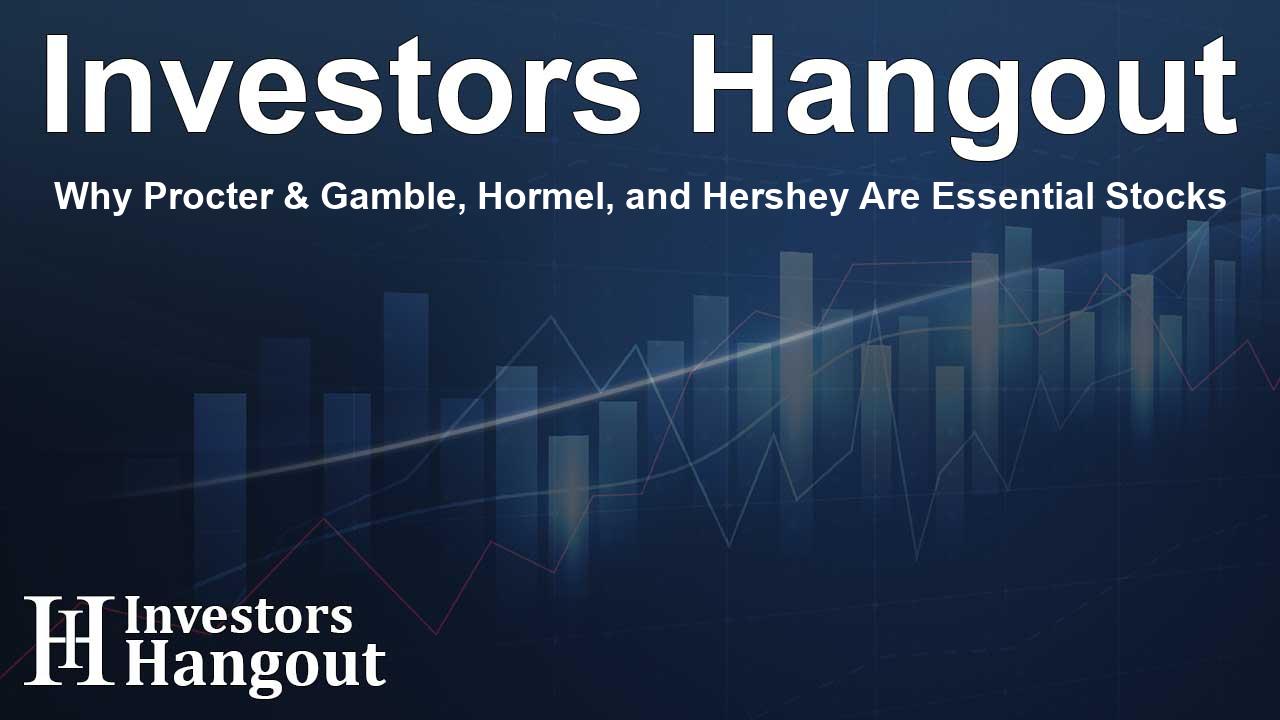Why Procter & Gamble, Hormel, and Hershey Are Essential Stocks

Investing in Reliable Dividend Stocks
When it comes to investing, identifying stocks you can trust is essential for a diversified portfolio. While every investor has their favorites, some stand out as true stalwarts—Procter & Gamble (NYSE: PG), Hormel Foods (NYSE: HRL), and Hershey (NYSE: HSY). These stocks, often considered "never-sell" stocks, are currently facing challenges, yet their long-term potential continues to shine. Here’s a closer look at why these names deserve a place in your investment strategy.
Procter & Gamble: A Resilient Performer
Procter & Gamble is a household name in the consumer goods sector, though its recent performance reflects the resilience of its business model. While the company's current dividend yield of 2.3% might seem modest, it signals a stable and fair valuation for an esteemed company. P&G faced hurdles in the past with stagnant growth, leading the stock to trade at higher yields. However, strategic transformations have allowed it to rebuild strength in crucial product lines.
In dealing with market pressures, P&G has become leaner, focusing on its most profitable brands. The company recently triumphed over a proxy battle with activist shareholder Nelson Peltz, affirming its commitment to refining its business strategy. The stock has proven that buying into companies with temporary setbacks can yield rewarding returns over time.
Hormel and Hershey: Current Challenges, Future Promises
Both Hormel Foods and Hershey are navigating their own sets of challenges, yet they remain attractive investment options for the savvy investor. Hormel is currently contending with difficulties in implementing price increases amidst soaring inflation and various supply chain issues. Additionally, its acquisition of Planters nuts coincided with a downturn in the nut segment, further complicating its market position.
Hershey, on the other hand, is grappling with an overhaul of its distribution system. This transition has created short-term revenue fluctuations as customers stock up due to uncertainties in service consistency. Compounding this, the rising cost of cocoa threatens the margins for its beloved chocolate products, provoking investor concern.
Despite these temporary setbacks, both companies retain their status as Dividend Kings—a title denoting over 50 years of consistent dividend payments. The ability to maintain dividend payments demonstrates effective management that can weather economic storms, and both Hormel and Hershey have weathered them remarkably well.
Leveraging Time Arbitrage in Investments
In the world of investing, timing can be everything. As individuals, investors have the unique advantage of holding onto stocks longer without the pressure of quarterly performance that institutional investors face. This flexibility, often termed 'time arbitrage,' allows individual investors to benefit from the volatility of the market by buying undervalued stocks during challenging periods. This is especially true in the current landscape for Hormel and Hershey.
By focusing on reputable companies with solid histories in dividend payouts, investors can identify those poised for recovery and long-term growth. The market sometimes undervalues strong companies due to short-term challenges, but this presents a unique opportunity for those who can look past immediate issues and recognize the inherent value.
Should You Consider Investing in Procter & Gamble?
For those contemplating an investment in Procter & Gamble, it is indeed a worthwhile consideration. Its strong franchise of brands and steady dividend increases make it a solid addition. The current climate suggests that while there might be short-term worries, the long-term trajectory remains upward. Aligning your portfolio with companies that have demonstrated resilience, like Procter & Gamble, Hormel, and Hershey, can pay off significantly in the years to come.
Frequently Asked Questions
What makes Procter & Gamble a reliable investment?
Procter & Gamble has a long-standing reputation for stability, with a track record of consistent dividend payments and effective management strategies that navigate market challenges.
Why are Hormel and Hershey currently facing challenges?
Hormel is struggling with price increases and supply chain issues, while Hershey is adapting to distribution system changes and facing rising costs for cocoa.
What is "time arbitrage" in investing?
Time arbitrage refers to the ability of individual investors to hold stocks long-term without the pressures faced by institutional investors, allowing them to capitalize on undervalued assets during market downturns.
Are Hormel and Hershey good investment options despite their challenges?
Yes, both companies are considered reliable dividend-paying stocks with strong histories, providing an attractive opportunity for long-term investors.
How can dividends impact investment decisions?
Dividends can enhance total returns and provide a steady income stream, which is particularly appealing for long-term investors focusing on financial stability and growth.
About Investors Hangout
Investors Hangout is a leading online stock forum for financial discussion and learning, offering a wide range of free tools and resources. It draws in traders of all levels, who exchange market knowledge, investigate trading tactics, and keep an eye on industry developments in real time. Featuring financial articles, stock message boards, quotes, charts, company profiles, and live news updates. Through cooperative learning and a wealth of informational resources, it helps users from novices creating their first portfolios to experts honing their techniques. Join Investors Hangout today: https://investorshangout.com/
Disclaimer: The content of this article is solely for general informational purposes only; it does not represent legal, financial, or investment advice. Investors Hangout does not offer financial advice; the author is not a licensed financial advisor. Consult a qualified advisor before making any financial or investment decisions based on this article. The author's interpretation of publicly available data shapes the opinions presented here; as a result, they should not be taken as advice to purchase, sell, or hold any securities mentioned or any other investments. The author does not guarantee the accuracy, completeness, or timeliness of any material, providing it "as is." Information and market conditions may change; past performance is not indicative of future outcomes. If any of the material offered here is inaccurate, please contact us for corrections.